
The Order of Orange-Nassau is a civil and military Dutch order of chivalry founded on 4 April 1892 by the queen regent, Emma of the Netherlands.
Hero of Ukraine is the highest national decoration that can be conferred upon an individual citizen by the President of Ukraine.

The Order of Honour is an order of Greece. It comes second in rank to the Order of the Redeemer, and was established in 1975, replacing the abolished Royal Order of George I.

The Order of Ushakov is a military decoration of the Russian Federation named in honour of admiral Fyodor Ushakov (1744–1817) who never lost a battle and was proclaimed patron saint of the Russian Navy. It is bestowed to command grade naval officers for outstanding leadership. The order was established in two classes during World War II by decision of the Presidium of the Supreme Soviet of the USSR of March 3, 1944. The idea was given to Joseph Stalin by admiral Nikolai Gerasimovich Kuznetsov in the summer of 1943. Following the 1991 dissolution of the USSR, the Order of Ushakov was retained unchanged by Decision of the Supreme Soviet of the Russian Federation 2557-I of March 20, 1992 but it was not awarded in this form. The all encompassing Presidential Decree 1099 of September 7, 2010 that modernised and reorganised the entire Russian awards system away from its Soviet past amended the Order to its present form, a ribbon mounted single class Order.

The Order for Merits to Lithuania is an award, presented by the President of Lithuania, which may be conferred on the citizens of Lithuania and foreign nationals for distinguished services promoting name of Lithuania, expanding a develop international relationships, for distinguished merits in social, culture, science, business, sport, military and in other areas. The award is presented in five classes, in ascending order, Knight, Officer, Commander, Grand Commander, and Grand Cross.
Awards and decorations of Armenia are military and civil decorations of Armenia which are bestowed by various agencies of the Armenian government for acts of accomplishment benefiting the government and the Armenian nation as a whole.
Colombian military decorations date back as far as the founding of the country. An early decoration was the Cruz de Boyacá that was awarded to the generals who led their forces to victory in the Battle of Boyacá in 1819. This early decoration lives on today as an incarnation of the highest order presented by the Colombian state. There is one decoration higher, but it is only awarded for military conflicts in defence of Colombia. Other than military decorations, Colombia presents decorations on behalf of the National Government, decorations for the National Police, and decorations from the Congress of Colombia.
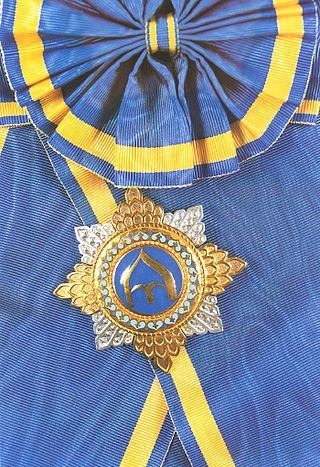
The Order of Prince Yaroslav the Wise is a Ukrainian award. It is awarded for distinguished services to the state and people of the Ukrainian nation in the field of state building, strengthening the international prestige of Ukraine, development of economy, science, education, culture, art, health care, for outstanding charitable, humanistic and public activities. The Order is named for Yaroslav I Vladimirovich (c. 978–1054), better known as Yaroslav the Wise, a Grand Prince of Kyiv 1019–1054. It was instituted on 23 August 1995 by the Ukrainian President, Leonid Kuchma.
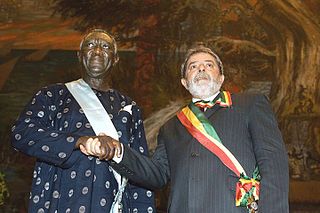
The Order of the Star of Ghana is the second-highest award given by the Government of Ghana to any individual who had helped the cause of the country in one way or the other. Recipients of this award are decorated at a state function, chaired by the President of the Republic. It was the highest national award until 23 June 2008, when it was superseded by the Grand Order of the Star and Eagles of Ghana.

The Order of Parental Glory is a state award of the Russian Federation. It was established on May 13, 2008 by presidential decree 775 to reward deserving parents of exceptionally large families. It can trace its origins to the Soviet Order "Mother Heroine". The Order's statute was amended on September 7, 2010 by presidential decree 1099, the same document that established the Medal of the Order of Parental Glory.

The Order "For Merit to the Fatherland" is a state decoration of the Russian Federation. It was instituted on 2 March 1994 by Presidential Decree 442. Until the re-establishment of the Order of St. Andrew in 1998, it was the highest order of the Russian Federation. The order's status was modified on 6 January 1999 by Presidential Decree 19 and again on 7 September 2010 by Presidential Decree 1099.
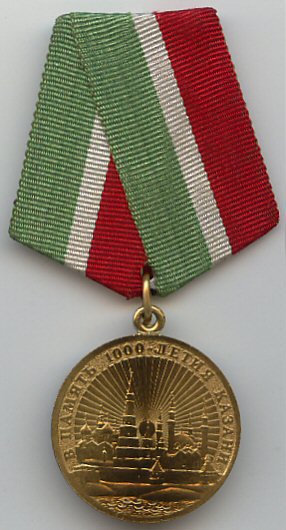
The Medal "In Commemoration of the 1000th Anniversary of Kazan" is a state commemorative medal of the Russian Federation established on June 30, 2005, by Presidential Decree No. 762 to denote the 1000th anniversary of the foundation of Kazan, the capital city of Tatarstan.

The Decoration "For Impeccable Service" is a state decoration of the Russian Federation aimed at recognising impeccable civilian or military service to the state beyond the scope of normal long service medals.

The Medal "For Distinction in Military Service" was a military decoration awarded in two classes by the Soviet Union and later by the Russian Federation, to deserving military personnel of the Ministry of Defense, of internal troops and of border troops of both the USSR and Russian Federation. It was gradually phased out following the dissolution of the USSR being replaced by various ministerial awards.

The Medal "For Impeccable Service" was a Soviet military award for long service awarded to deserving members of the military personnel of the armed forces of the USSR, of the Interior Ministry of the USSR and of the Ministry for the Protection of Public Order of the USSR, to recognise ten, fifteen and twenty years of faithful and impeccable service to the state.

The National Order of Merit is a state order of the Republic of Malta. The order is divided into four grades that may be awarded to Maltese citizens.
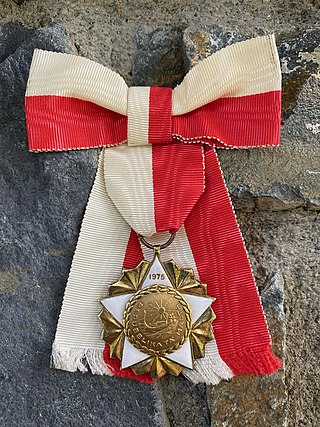
The Midalja għall-Qadi tar-Repubblika is a medal of the Republic of Malta. The medal is awarded by the President of Malta, with the written approval of the Prime Minister of Malta, for distinguished service to Malta. The award is presented to Maltese citizens and organizations, but may be awarded to foreigners on an honorary basis for service which merits recognition. No more than ten Maltese citizens may be awarded the medal over the course of a year. The medal may be awarded posthumously.
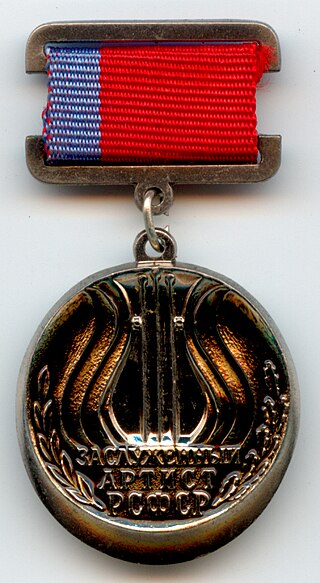
Honored Artist of the RSFSR was an honorary title granted to Soviet artists, including theatre and film directors, choreographers, music performers, and orchestra conductors, who had outstanding achievements in the arts, and who lived in the Russian Soviet Federative Socialist Republic (RSFSR) from 1931 to 1991.
The Hungarian Order of Honour was established in 2011 by Act CCII of 2011. Although the law does not mention the hierarchy, it proposes that the Hungarian Order of Honour is the third highest state award in the Hungarian honours system, after the Hungarian Order of Saint Stephen and the Hungarian Corvin Chain.

The Rescuer City distinction is an honorary award established by the President of Ukraine Volodymyr Zelenskyy to celebrate the humanitarianism, charity, and solidarity that different foreign cities shared with the Ukrainian people to defend the ideals of freedom, peace, and democracy. The award also represents the support given the city's residents to Ukraine's defense of its national independence and sovereignty while resisting against Russia's armed aggression during its invasion of Ukraine.

















